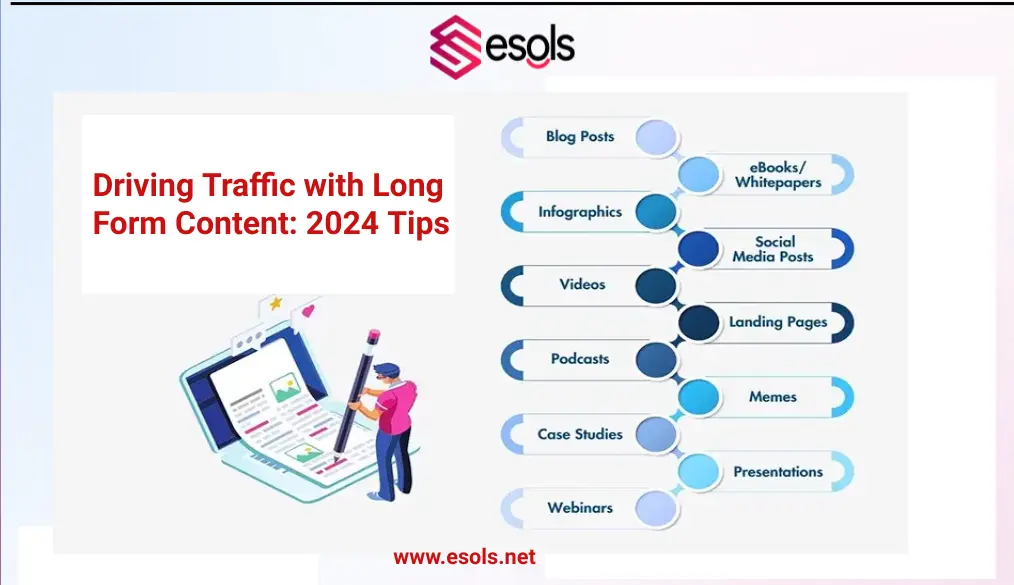Every business strives to grab organic website traffic. After all, it aims to raise brand awareness, engage with audiences and generate sales. Have you ever tried to increase your traffic on your own? It seems like a daunting task, right?
This article will explain how you can how you can do Driving Traffic with Long Form Content
Table of contents
Drive Traffic with long form Content
Useful content remains a key for any business to attract an audience, educate and convert them. However, many digital marketing agencies overlook it. We have brought some useful information for you on how you can earn a top spot through long form content
2024 Tips for Creating Long-Form Content
Research and Understand Your Audience
Before you start writing, it’s crucial to understand who your audience is and what they are looking for. Use tools like Google Analytics, social media insights, and keyword research tools to gather data on your target audience’s interests and pain points.

Choose Relevant and Evergreen Topics
Choosing relevant and evergreen topics ensures that your content remains valuable and engaging over time. Evergreen content addresses timeless issues or topics that consistently interest your audience, providing ongoing value and attracting continuous traffic. By focusing on these enduring themes, you create resources that users will refer back to repeatedly.
This strategy maximizes your content’s longevity and impact, keeping it relevant and useful far beyond its initial publication. It also helps build a stable foundation of quality content that supports long-term audience engagement and growth.
Craft Compelling Headlines
Crafting compelling headlines is crucial as they form the first impression readers have of your content. Make your headlines engaging, informative, and rich in keywords to attract clicks. Utilize tools like CoSchedule’s Headline Analyzer to optimize them. An effective headline grabs attention, provides a clear idea of what to expect, and encourages readers to click and explore further. Investing time in creating strong headlines can significantly increase your content’s visibility and readership.
Structure Your Content for Readability
Break down your content into manageable sections with subheadings, bullet points, and numbered lists. This makes it easier for readers to scan and digest the information. It helps the reader to understand the topic in less time.

Below is how you can do that
| Point | Explanation |
| Use Subheadings | Subheadings break content into sections, making it easier for readers to navigate. They provide a clear structure and highlight key topics. |
| Bullet Points | Bullet points help in presenting information concisely. They are ideal for lists and ensure that important details stand out without overwhelming the reader. |
| Numbered Lists | Numbered lists are useful for step-by-step instructions or when the order of items matters. They guide the reader through a sequence of information logically. |
| Short Paragraphs | Keeping paragraphs short enhances readability. Long blocks of text can be daunting, while short paragraphs make the content more approachable and easier to read. |
| Visual Aids | Incorporating images, charts, and tables can break up text and provide visual interest. They help in explaining complex information more clearly and make the content engaging. |
Provide In-Depth Information
Offer valuable, in-depth information that thoroughly covers the topic. Use data, statistics, case studies, and expert quotes to back up your points. Aim to be the ultimate resource on the subject.
Optimize for SEO
Incorporate relevant keywords naturally throughout your content. Optimize meta descriptions, image alt texts, and internal links to improve your search engine visibility. Ensure your content is mobile-friendly and loads quickly.

Reference : Zero gravity marketing
Use Multimedia Elements
Enhance your long-form content with multimedia elements such as images, infographics, videos, and interactive content. This not only makes your content more engaging but also caters to different learning styles.
Measure and Analyze Performance
Use tools like Google Analytics and Search Console to track the performance of your long-form content. Analyze metrics such as organic traffic, engagement rates, and conversion rates to understand what’s working and what needs improvement.
Conclusion
Driving traffic with long-form content is a proven strategy that requires careful planning and execution. By understanding your audience, choosing the right topics, optimizing for SEO, and promoting effectively, you can create content that not only attracts traffic but also engages and converts your readers. Stay committed to quality and relevance, and you’ll see the long-term benefits of your efforts.
Read more : How to Conduct Effective Market Research in 2024
FAQ’s
Long-form content typically refers to articles or blog posts that exceed 1,000 words and provide in-depth information on a specific topic.
Search engines favor long-form content because it tends to be more comprehensive and informative, leading to higher rankings and increased organic traffic.
It’s recommended to review and update your long-form content at least once a year to ensure it remains relevant and accurate.
Tools like Google Analytics, keyword research tools, CoSchedule’s Headline Analyzer, and content management systems can assist in creating and optimizing long-form content.


